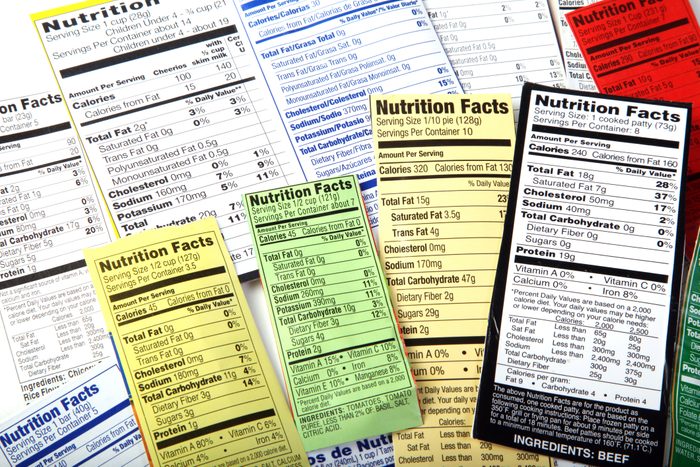
Why do some people develop eating disorders?
It’s thought that 30 million people of all ages and genders in the U.S. have an eating disorder. Considering eating disorders are so common, you might be curious to know what causes an unhealthy relationship with food. The long and the short answer is both your genetics and societal influences.
“We say that genetics load the gun and environment pulls the trigger,” explains Bonnie Brennan, senior clinical director of adult residential and partial hospital services at Eating Recovery Center in Denver, Colorado. “Genetic predisposition, though not necessary, can play a big part in the risk.”
In fact, a study published in 2017 in the American Journal of Psychiatry shows that in addition to the psychosocial component, biological factors also play an extremely important role in the onset of anorexia nervosa. “More research is needed to determine the prevalence of eating disorders among those of different races and ethnicities, but we do see symptoms of eating disorders across all populations,” says Brennan.

A big life change can evoke an eating disorder
You might not realize you have a predisposition to anorexia or binge eating (especially if your parents never discussed their struggles with you) until something life-altering or impactful happens to you (aka a trigger). “Those at higher risk may also be struggling with other mental health and substance use problems, stressors, or exposure to activities that emphasize size and weight,” says Brennan. “We also see eating disorders develop in response to life stage changes such as puberty, going to college, mid-life challenges, and loss of relationships.” (Here are 20 secrets addiction counselors desperately want you to know.)

It’s not just anorexia that’s deadly
Though anorexia tends to get more media coverage, there are several types of what’s known as body dysmorphic disorder (unhealthy relationships with body image). Anorexia is classically defined as someone who severely restricts their caloric intake—either by not eating or exercising heavily to burn calories. Bulimia is characterized by a rollercoaster of binge eating, followed by purging—making themselves throw up or have diarrhea. “Exercise-orexia,” though not an official diagnosis, is the name given to people exercise compulsively. Orthorexia is a condition of being hyper-focused on eating only the healthiest, cleanest foods. Another less well-known disorder is binge eating, in which you scarf down more than what’s comfortable, with no control over your actions. A review of studies published in 2018 in the journal F1000 Research suggests that antidepressants and various cognitive behavioral therapy modalities are effective treatments in reducing the severity of body dysmorphia, but there are a significant percentage of patients who are treatment-resistant. All of these conditions can be life threatening and dangerous, and they all have similar warning signs.

Sign #1: You think about food all the time
Take a moment and reflect on the past few hours of your day. Whether you were spending time with pals, running errands, or working, what thoughts consumed your mind? If food is at the forefront of your consciousness nearly all the time—how you’re going to eat it and prepare it, what you might do to make up for eating behaviors that you have determined are unacceptable—you could be heading down an unhealthy road. “Having an obsessive focus on food to the point of it inhibiting your daily life can be a warning sign of an eating disorder,” says Claire Mysko, chief executive officer of The National Eating Disorders Association (NEDA). “Although being aware of nutritional quality isn’t a problem in and of itself, there is a presentation of disordered eating called orthorexia, which occurs when an individual becomes fixated on healthy eating to a point of actual damage to their well-being.” If you’re anxious about how much mental energy you’re dedicating to calories, nutritional value, and food quantity, consider recording how often these thoughts come along. You can bring this information to your doctor, who can help you understand how to control and reduce these instances.

Sign #2: Dieting makes you feel confident
Brennan says that a high percentage of patients at the Eating Recovery Center reported that trying out a diet and seeing results was what caused their eating disorder to begin. While it might seem harmless to eat healthier and shed pounds, it’s less about the physical act of dropping pounds, and more about how it makes you feel, and how you define yourself as a person. “Often what starts as an innocent attempt to diet or eat healthy can kickstart an eating disorder, as the individual quickly finds that their new behavior ‘solves other problems,’ such as increasing peer acceptance, soothing anxiety, or getting attention in a new way,” Brennan explains. Many experts now say diets in general don’t work and that intuitive eating is better for your body. (Check these signs of an anxiety disorder, to rule out that potential trigger.)

Sign #3: You’re avoiding dealing with something big
No matter how rosy your life appears to your friends on social media, part of being human is enduring the natural ups and downs of life. However, if you’ve recently experienced a death in the family, a scary car accident, or even a disappointing breakup, you might be inclined to skip through the recovery steps and instead, focus on something you feel you can control. “In times of great stress, people tend to revert to past coping strategies as a way to feel more in control, which can include eating disorder behaviors,” says Mysko. “Change in routine can heighten anxiety, something we are seeing now during the Covid-19 pandemic. It’s important that individuals feel supported and have access to resources in order to understand various ways of coping. At NEDA, we’ve adapted our services in order to make sure our community is supported during times of change. Our helpline is completely virtual, with representatives available via phone or text. Additionally, we have an online chat available for any information, resources or support that is needed.” (Check out these stress management tips from experts that can also help.)

Sign #4: You scrutinize every nutrition label
You want to make sure you’re not eating overly processed foods riddled with unnecessary added sugar or chemicals. But if you’re spending hours looking over ingredients on food labels, you might be developing a dangerous obsession. People with orthorexia nervosa, in an attempt to be a healthy eater, start to eliminate more and more foods they perceive as “bad,” and will only allow themselves to eat “good” foods. But when you begin to give whole groups of food a positive or negative connotation, you often miss out on essential ingredients and nutrients that your body needs to function properly. A review of studies published in 2018 in Frontiers in Psychology suggests that people who live in a culture that elevates the virtues of healthy living are most at risk for developing orthorexia. “Our bodies are not meant to follow rigid, prescribed diets for long periods of time,” Brennan says. “They’ve evolved over time to need certain combinations of nutrients to keep us going and keep us healthy.”

Sign #5: You’re getting increasingly rigid about food choices
If you always modify your food order at restaurants to the point that it raises eyebrows with your friends, it might be time to reexamine your motivation. The stricter you become with what you eat, the less enjoyment you get out of your meal. “A hyper-focus on what you are eating, or not, can negatively affect a person’s relationship with food long term as well as negatively impact normal life activities,” says Mysko. “Obsession with food, along with the ordinary pressure to look a certain way, can be extremely dangerous. Unfortunately, society plays a role in perpetuating the notion that foods are ‘good’ or ‘bad.’ ” If this sounds like you, you may want to seek guidance and consultation from a registered dietitian about your nutritional needs and how to balance your diet. (Read this woman’s anorexia recovery story that proves healing is possible.)

Sign #6: You are obsessed with how much you weigh
There are so many numbers that arguably matter more than how much you weigh—your resting heart rate and your cholesterol level, to name a few. So if you have a sudden, paralyzing, hyper-focused viewpoint on those numbers down by your toes, you may be developing a dysfunctional relationship with the scale. “Do you find that you are secretly weighing yourself more often than normal? Is your mood for the day dramatically changed by the number on the scale? This could be a silent sign of an eating disorder developing,” says Brennan.

Sign #7: You use laxatives to drop weight
Laxatives can be helpful occasionally for people with digestive problems; they’re not meant as a weight-loss aid. “Laxatives, cleanses, diuretics, and diet pills are often abused by people who are desperate to see the number on the scale go down,” says Brennan. “If you find yourself in a codependent relationship with your scale, try putting it away or having a friend store it for you for a while. If you need to weigh yourself in order to follow medical advice, talk with your provider about alternatives to having a scale in the home, such as using the scale at a gym or pharmacy one time per week.” It can be very freeing to have your day start without they tyranny of the number on the scale.

Sign #8: You eat until you’re stuffed, and you can’t stop
Just as someone who is struggling with anorexia-like symptoms cuts way back on what they eat, another person who battles overeating might not be able to stop. “All of us eat more than is comfortable from time to time,” Brennan says. “However, if you find yourself repeating a pattern of planning on eating to the point of being stuffed or if you are experiencing a loss of control with eating, it could be a silent sign of the beginning of binge eating disorder.” You might turn to this habit during high-stress times, when you need to quell your worries and anxieties. “Foods, especially sugary, carbohydrate-rich sweets and snacks, can give one a rush of pleasure and sense of comfort and calm,” Brennan says. According to a study published in 2019 in the Journal of Eating Disorders, treatments that target low self-esteem—a common trait among binge eaters—and emotional regulation skills are likely to help reduce binge-eating episodes. Brennan recommends experimenting with healthy self-care behaviors such as a warm bath or sauna, using a weighted blanket, cuddling with a favorite pet, or trying a restorative yoga practice such as yin yoga or yoga nidra. (Check out these 7 ways naturally calm people handle stress.)

Sign #9: You berate yourself if you don’t work out every day
Regular exercise is essential for ideal health, and doctors recommend at least three to four workout sessions a week. But if you find yourself freaking out when you miss leg day at the gym, you might be developing an unhealthy attachment to your fitness regimen. “There is no doubt that a regular exercise practice is healthy and can help alleviate stress and mental health issues such as anxiety and depression,” says Brennan. However, “if you are doing things like skipping your kids’ dance recital, turning down social invitations, or feeling compelled to exercise in the middle of the night, you may be developing a compulsive relationship with exercise. This can lead to eating disorders and dangerous weight loss, poor nutrition, fragile bones, and injuries.” If this is you, see a sports psychologist and registered dietitian who specializes in sports nutrition to help you get on a balanced movement plan.

Sign #10: You follow “thinspiration” Instagram accounts
It’s never been easier (or encouraged) to follow the lives of celebrities. You can see what nearly any model or actress is doing at any hour of the day via their social media accounts, and while it might be interesting, it could also create some pretty negative and damaging expectations for what your body should look like. And it’s not only celebs. Social media influencers with the so-called “perfect body” can be dangerous to follow too. “Social media sites that post Thinspo and Fitspo media images and messages meant to inspire thinness and fitness, can lure people into the spiral of feeling less than and ashamed for not being thin or fit enough,” Brennan says. Unfollow these accounts so you won’t be constantly tempted and pressured to change who you are. (Here are 10 ways to have a healthier relationship with social media.)

Sign #11: You’re feeling ashamed of yourself
Repeat after us: Never, ever shame yourself about your relationship with food and your body. A study published in 2018 in Frontiers in Psychology suggests a direct link between that sort of behavior and body dissatisfaction. “All coping skills serve the function of helping us to survive tough times, and sometimes these coping skills can also become problems, whether it’s in the form of food, exercise, substance use, or working, to name a few,” Brennan says. “Try to assess and consider the function your behavior is serving, and seek help from professionals and your support system.” For additional information about Eating Recovery Center, visit eatingrecoverycenter.com to speak with a clinician who can guide you.
If you or a loved one is struggling with obsessive thoughts around food or your body, contact the National Eating Disorders Association helpline at 1-800-931-2237 or a local eating disorder professional.
